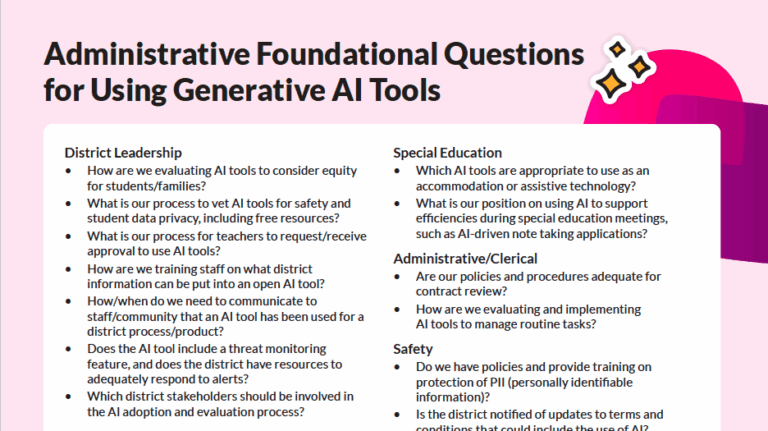This resource is provided by ACSA Partner4Purpose Fagen Friedman & Fulfrost, LLP (F3).
Who is required to report?
Penal Code section 11165.7 defines as a “mandatory reporter” and it includes virtually all public employees of a school district.
What do you have to report?
You are required to make a report whenever you, in your professional capacity or within the scope of your employment, have knowledge of or observed a child (an individual under the age of 18) who you know or reasonably suspect has been the victim of child abuse or neglect.
What does reasonable suspicion mean?
- Reasonable suspicion does not require certainty that child abuse or neglect has occurred or that a child has made a specific allegation or that there is a medical indication of child abuse or neglect.
- Reasonable suspicion means that it is objectively reasonable for a person in a similar position, based on his/her training or experience, to reasonably suspect that child abuse or neglect has occurred
What is “child abuse” or “neglect”?
- Physical injury or death inflicted by means other than accident by another person
Sexual abuse (including sexual assault and sexual exploitation) - Neglect, both “severe” (failure to protect against malnutrition; endangering a child’s health, including intentional failure to provide adequate food, clothing, shelter, or medical care) and “general” (failure to provide adequate food, clothing, shelter, medical care or supervision)
- Willful harming or injuring of a child or the endangerment of the person or health of child
- Unlawful corporal punishment or injury
Four basic areas in which abuse may be revealed:
- Environmental problems (e.g. hazardous or unsanitary conditions in the home)
- Parental or caregiver clues, such as indifference to the child, inappropriate thoughts or feeling about the child, or unduly harsh or rigid ideas about caring for the child
- Physical indicators on the child, such as burns, bruises, or unattended medical conditions o Behavioral indicators in the child, such as hostility, depression, or aggressiveness
- The fact that a student is homeless or unaccompanied is not, by itself, a sufficient basis for reporting child abuse or neglect.
Making the report
Step 1
Immediately, or as soon as possible, call one of the following agencies:
- Any police department or sheriff’s department – NOT the school district police or security department
- County probation department, if designated by the county to receive such reports
- The county welfare department (Child Protective Services)
Step 2
Within 36 hours of obtaining information about the incident, you must prepare and send, fax or email a written follow-up report, including any non-privileged documentary evidence you have relating to the incident. This report must include all of the following information (if known):
- Your name, business address, and telephone number;
- Your position at the district;
- The information that gave rise to the reasonable suspicion of child abuse or neglect and the source or sources of that information;
- The child’s name, the child’s address, present location, and, if applicable, school, grade, and class; the names, addresses, and telephone numbers of the child’s parents or guardians; and the name, address, telephone number, and other relevant personal information about the person or persons who might have abused or neglected the child.
If you cannot reach one of the agencies in Step 1 after reasonable effort, you must immediately, by fax or electronic transmission, make a one-time automated written report on a Department of Justice form. You do not have to submit a written follow-up report as outlined in Step 2 if you file this one-time report. In this report, you must state clearly the purpose of the report and why you could not complete the initial telephone call to one of the agencies.
What happens if I don’t make a report?
If you willfully fail to make a report or impede or inhibit another person from making a report, and the abuse or neglect results in death or great bodily injury to the child, the punishment is not more one year in county jail, a fine of not more than $5,000, or both. A supervisor or administrator who impedes or inhibits another person from making a report will be guilty of a misdemeanor punishable by up to six months in a county jail, a fine of not more than $1000, or both.
Can I be held civilly or criminally liable for making a report?
No. You cannot be held civilly or criminally liable for any report required under CANRA. This applies even if you acquire knowledge of or have reasonable suspicion of child abuse outside of your professional capacity or scope of your employment.
What are the roles of my supervisors and administrators?
Supervisors and administrators cannot impede or inhibit you from your reporting duties as a mandated reporter. For example, your supervisor cannot subject you to any sanction or discipline if you make a report pursuant to your mandated reporter duties. You cannot be disciplined or retaliated against for making a report based on reasonable suspicion of child abuse, and the district also cannot require that your identity is disclosed.
It is unacceptable to make the report to your supervisor, a colleague, or an administrator only. You have an affirmative duty to make the report yourself if you reasonably suspect that a student may be suffering child abuse. If one or more mandated reporters have joint knowledge of possible child abuse, only one individual will be required to report so long as there is mutual agreement to do so.
Will the report be made confidential?
Yes, all reports of child abuse or neglect and the information contained therein are confidential, including the reporter’s identity, and may only be disclosed among agencies receiving or investigating the reports and in other limited contexts. Your identity shall not be disclosed to the district by the receiving agency unless you consent to such disclosure or by court order.
Read the full text of CANRA here.
This information is a summary only and not legal advice. It is recommended that you consult with legal counsel to determine how this may apply to your specific facts and circumstances.

































